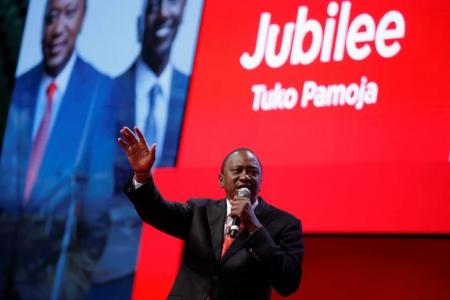
By Katharine Houreld
NAIROBI (Reuters) – Kenya’s ruling party promised to expand free education and healthcare in a manifesto published on Monday, but did not acknowledge problems in existing social services that have triggered strikes as elections approach.
President Uhuru Kenyatta, the head of the Jubilee Party, is seeking a second and final five-year term in office in the Aug. 8 polls. Voters will choose a president, legislators and local representatives.
Public debates have focused on social services and the cost of living, although some voters will cleave to tribal allegiances. More than 1,200 people were killed after the 2007 polls when political protests unleashed ethnic violence.
Kenyatta’s chief rival, veteran opposition leader Raila Odinga, is heading the National Super Alliance, a coalition of opposition parties that has yet to publish its manifesto.
In its new policy pledges, Jubilee promised to provide free, quality primary healthcare for all Kenyans; free secondary education; affordable housing and connect every citizen to the electricity grid by 2020.
Kenyatta, the wealthy 55-year-old son of the country’s first president, said he has slashed maternal mortality, overseen devolution, built new roads and opened a new Chinese-built railway linking the port of Mombasa to the capital Nairobi.
“Employment creation is at the heart of the next Jubilee administration’s priorities,” he wrote in a preface to the manifesto.
Reuters was not able to independently verify all the president’s assertions, but maternal mortality has been falling in Kenya since 2003, and the Kenya Power Company said it has 6.1 million connections, up from 2.26 million in March 2013, just before Kenyatta took office. Many new roads have been built and the first phase of railway opened last month.
The Kenyan economy grew at 5.8 percent last year, far outstripping the sub-Saharan average of 1.3 percent.
But challenges remain, the cost of living chief among them. Annual inflation was at 11.7 percent in May, the highest for five years. High prices and a regional drought have caused a national shortage of the staple maize flour.
“How can we vote for this government when people’s children are hungry?” asked mother-of-three and registered voter Mercy Indiazi.
Education standards also concerned her: Kenya introduced free primary education in 2003, but media reports about absent teachers, missing classroom materials and poor standards are also common.
The manifesto also highlighted advances in healthcare, although Kenyan doctors went on strike for four months, beginning last December, over poor pay and conditions.
Union officials said that doctors often had to conduct operations without basic equipment such as gloves. University professors have also mounted sporadic strikes over pay and conditions.
(Additional reporting by George Obulutsa; Writing by Katharine Houreld; Editing by Alison Williams)